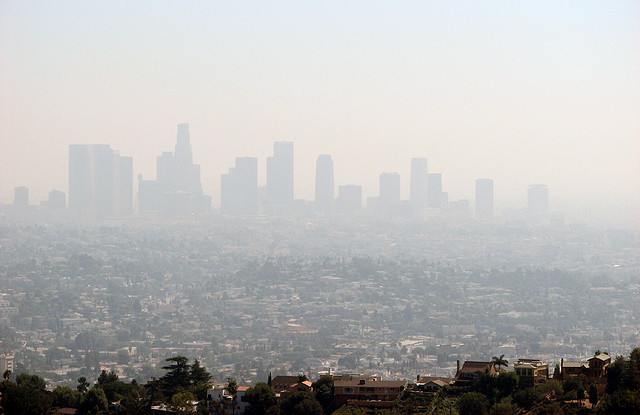Recent U.S. Presidents have issued a series of executive orders (EOs) that steadily expand federal agencies’ responsibilities to conduct their own activities in environmentally sound ways. President Clinton issued a number of EOs during 1993-1999 as part of “Greening the Government,” which were expanded upon and superseded by President George W. Bush’s 2007 EO Number 13423 “Strengthening Federal Environmental, Energy, and Transportation Management.” Since taking office, President Obama has continued these expansions. Last month, he issued EO Number 13693 to require “Planning for Federal Sustainability in the Next Decade.” This EO also revokes a number of President Obama’s own relevant EOs, and President Bush’s EO Number 13423.
Audit, Compliance and Risk Blog
Obama Expands Federal Agencies’ Responsibilities for Sustainability
Posted by Jon Elliott on Mon, Apr 13, 2015
Tags: Environmental risks, Environmental, ghg, Transportation, sustainability
Have You Completed Your Hazardous Materials Management Plan?
Posted by Jon Elliott on Wed, Feb 25, 2015
A wide variety of federal, state and even local laws apply environmental, health and safety (EH&S) protection requirements to chemicals. EH&S compliance personnel are accustomed to complying with chemical management requirements imposed by the Environmental Protection Agency (EPA), Occupational Safety and Health Administration (OSHA), and their state equivalents.
Tags: Corporate Governance, Health & Safety, OSHA, California Legislation, Environmental risks, Environmental, EPA, Greenhouse Gas, ghg, Hazcom
Being a good citizen and composting food scraps really isn’t that hard if you live in a house. But what if you live in a condo? You might think it isn’t possible (or maybe you even think it isn’t worth it) to do your part and compost your organic wastes. Let me show you how to do it and why it’s worth it.
Tags: Health & Safety, Environmental risks, Environmental, EHS, Greenhouse Gas, ghg
EPA Proposes Stricter Standards For Ground Level Ozone in Ambient Air
Posted by Jon Elliott on Mon, Jan 19, 2015
The Clean Air Act (CAA) requires the Environmental Protection Agency (EPA) to create a list of air pollutants based on emissions that cause or contribute to air pollution that may reasonably be anticipated to endanger public health or welfare. EPA also sets air quality criteria for acceptable concentrations in ambient air, referred to as National Ambient Air Quality Standards (NAAQS).
Tags: Environmental risks, Environmental, EPA, Greenhouse Gas, ghg, climate change
To Frack Or Not To Frack? California and New York Provide Opposite Answers
Posted by Jon Elliott on Mon, Dec 22, 2014
Many readers will know that political and legal regulatory developments have lagged the technical developments in hydraulic fracturing and other enhanced oil and gas recovery techniques – “fracking.” Some jurisdictions focus on the jobs and taxes that result from resource extraction, while others focus on the potential environmental hazards. As 2015 begins, we find California and New York – which typically agree on significant environmental policy questions – adopting opposite responses.
Tags: Business & Legal, Environmental risks, EPA, ghg, fracking, hydraulic fracking
U.S. And China Try To Change The Climate Change Conversation
Posted by Jon Elliott on Wed, Nov 26, 2014
On November 12, U.S. President Barack Obama and Chinese President Xi Jinping announced a bilateral agreement to cut greenhouse gas (GHG) emissions. Since these countries are the two biggest economies and largest emitters of GHGs – and are in a period when they seem to disagree about almost everything – this agreement has substantial symbolic value. But will it have much practical value?
Tags: Business & Legal, Environmental risks, Environmental, Greenhouse Gas, ghg
PHMSA Requires Advance Notice of Construction-Related Events
Posted by Allison Campbell on Mon, Oct 20, 2014
To ensure that operations at gas pipelines, gas pipeline facilities, and LNG plants and facilities are in compliance with a range of conditions, operators of such plants and facilities must provide the US Department of Transportation Pipeline and Hazardous Materials Safety Administration (PHMSA) with 60 days’ advance notice of construction-related events. This advance notice allows time for reviews and inspections to identify any potential compliance issues and avoid costly design changes or delays.
Tags: Corporate Governance, Business & Legal, Health & Safety, Environmental risks, ghg, fracking, hydraulic fracking, Oil & Gas
Important Clean Air Act (CAA) elements direct the US Environmental Protection Agency (EPA) to reduce emissions of hazardous air pollutants (HAPs). Unlike the conventional pollutants associated with regional problems such as smog or acid rain, HAPs represent a list of 187 specific air toxics that can be harmful in low concentrations in much smaller areas. HAPs are subject to tighter controls and lower permitting thresholds.
Tags: Business & Legal, Health & Safety, Environmental risks, Environmental, EHS, EPA, Greenhouse Gas, ghg, Hazcom, mact
Supreme Court Narrows EPA Authority to Regulate CO2 Emissions
Posted by Jon Elliott on Mon, Jul 21, 2014
Since the US Supreme Court affirmed in 2007 that the Clean Air Act (CAA) provides the Environmental Protection Agency (EPA) with authority to regulate carbon dioxide (CO2) and other greenhouse gases (GHGs), EPA has pursued a growing set of regulatory initiatives. In each, EPA has attempted to fit GHGs into statutory and regulatory programs originally designed for more conventional pollutants – and the entities it targets have sued the agency claiming the stretch to GHGs exceeds EPA’s authority. Each court decision has adjusted the contours of EPA’s CAA authority, legitimizing some stretches and vacating others.
Tags: Corporate Governance, Business & Legal, Environmental risks, Environmental, EHS, EPA, Greenhouse Gas, ghg
NTSB and PHMSA Focus on Facility Response Plans for Pipelines
Posted by Allison Campbell on Mon, Jul 14, 2014
Investigation of the 2010 spill at Marshall, Michigan, the largest on-land spill in US history, underlines the reality that a Facility Response Plan (FRP) is more than a government-required document—an inadequate document or plan can lead to environmental and economic disaster. Owners and operators of onshore pipelines must review and update FRPs every five years from the date of last submission or last approval, and whenever new or different operating conditions arise that would affect the plan. (49 CFR 194.121 Response Plan Review and Update Procedures). PHMSA recently released two Advisory Bulletins reminding operators what it requires in an FRP and listing five of the most common reasons for it to reject an FRP.
Tags: Corporate Governance, Business & Legal, Health & Safety, Environmental risks, Environmental, EHS, EPA, Greenhouse Gas, ghg, Hazcom, Oil & Gas, Transportation










